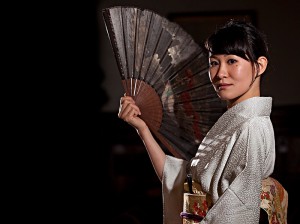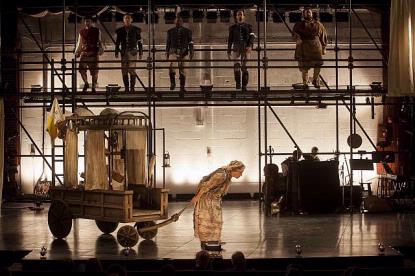Ah, those Berkshire “cottages,” the euphemism itself so evocative of the massive wealth that built them and the easy superiority that occupied them—stone mansions nestled in the hills, summer retreats for the New York elite of the Gilded Age, so exclusive, so WASP. So, what’s a Japanese actress doing in one of them, performing a one-woman play about a geisha?
The play tells a fascinating story, actually, although the connection to the venue is a bit tenuous. Ventfort Hall Mansion and Gilded Age Museum is one of those “cottages,” a comparatively modest red-brick pile in Lenox that over a century ago was owned by the brother and sister-in-law of banking magnate J.P. Morgan. Their son, George Denison Morgan, was a Japanophile who fell in love with and ultimately married a young geisha named Yuki Kato. Morgan O-Yuki: The Geisha of the Gilded Age is her story.
Yuki’s connection to the Morgans, and thus to Ventfort, was discovered by the museum’s resident historian, Joan Olshansky, who commissioned this play, which was first performed here in 2006. (There’s a Lenox connection to the playwright, too. Natsuko Ohama is primarily a voice teacher, trained by and still affiliated with Kristin Linklater, co-founder of Shakespeare & Company, which holds forth just around the corner from Ventfort Hall.)
Mayu Iwasaki portrays Yuki, first appearing on the hall’s grand staircase, welcoming us to Ventfort and implying that she’s a ghost whose spirit infuses the old timbers via her former in-laws. She then relates her life story—the child of a Kyoto swordsmith who, impoverished by the abolition of the samurai class, sells her to a geisha house, where she is trained in graceful arts to serve and entertain male clients, and where in 1902 she meets George Morgan.
We learn of her love for a young Japanese law student, to whom she remains faithful despite George’s repeated proposals of marriage. When she’s abandoned by her lover in favor of a bride who can further his career prospects, she finally consents to marry the rich American. The scene shifts to New York, where the exotic bride receives a less than enthusiastic welcome by the groom’s family, the elite of Gilded Age elite, and then to Paris, where her race and position are more readily accepted.
Iwasaki gives a performance as graceful and appealing as her character’s well-practiced charm, ably staged by Enrico Spada (another Shakespeare & Company connection). In the course of the narrative, she performs an abbreviated version of the tea ceremony, and later unwraps her kimono, in a gesture that is ceremonial in itself, to reveal a flapper-style dress in keeping with the Paris years and her increasing immersion in Western ways and wiles. She relates the years of her marriage—generally happy, apparently, despite her husband’s persistent philandering—her return to Japan after his death, only to endure the ravages of war with China and the United States, and her eventual settling in Paris and conversion of Catholicism.
This life story, familiar in Japan but practically unknown here, is mesmerizing—a portrait of an age seen from a unique perspective and of a smart, resourceful woman who was able to successfully negotiate two divergent worlds. The script, unfortunately, is less compelling than its subject: a too-straightforward first-person biography that lacks eloquence and rarely dips below the surface to explore what must have been currents of alienation, despair and, no doubt, contempt for the elegant practitioners of high-toned racism.
Iwasaki’s performance, while captivating, underscores this lack of depth, as she, too, rarely ventures beyond the pleasant, poised façade of the geisha—appropriate, perhaps, for the character welcoming us into the family manse as an engaging historical guide, but it diminishes the potential drama of an inherently dramatic tale.
Morgan O-Yuki: The Geisha of the Gilded Age performs Wednesday-Sunday through Sept. 1 at Ventfort Hall, 104 Walker St., Lenox, 413-637-3206, gildedage.org.

Courtesy of Ventfort Hall
The Mother of All Courage
And speaking of Shakespeare & Company—not to mention resourceful, determined women making their way in a man’s world—Ventfort’s Lenox neighbor is currently running Mother Courage and Her Children, Bertolt Brecht’s wartime masterpiece. Here, the model of perseverance, ingenuity and tactical compromise is Anna Fierling, proprietor of a commissary wagon plying the battlefields of the Thirty Years’ War, whose day-to-day goal is to scrape a living and keep her three children out of harm’s way.
It stars Olympia Dukakis, who’s played the part several times in her career and for whom it is in a way her defining role. The character’s sardonic view of human nature coupled with fierce protectiveness for her children is a perfect fit with Dukakis’ fiery presence and ironic humor—though I felt she could have given more scope to the latter.
Tony Simotes’ production finds both the guts and the heart in the play, aided by an outstanding cast. As Courage’s two would-be suitors, John Douglas Thompson as the field cook and Apollo Dukakis as the regimental chaplain are complementary contraries, both rather transparent manipulators but the one hearty and blustery to the other’s pious diffidence. The same disparity goes for Ryan Winkles and Josh Aaron McCabe as her two sons, the sweet, scrupulous rule-player vs. the savage swashbuckler. And Brooke Parks, who’s also playing the sharp-tongued Princess in S&Co’s current Love’s Labour’s Lost, is affectingly silent here as the mute daughter Kattrin.
Mother Courage runs through August 25 at Shakespeare & Company, 70 Kemble St., Lenox. (413) 637-3353, shakespeare.org.

Kevin Sprague photo
If you’d like to be notified of future posts, email StageStruck@crocker.com.


